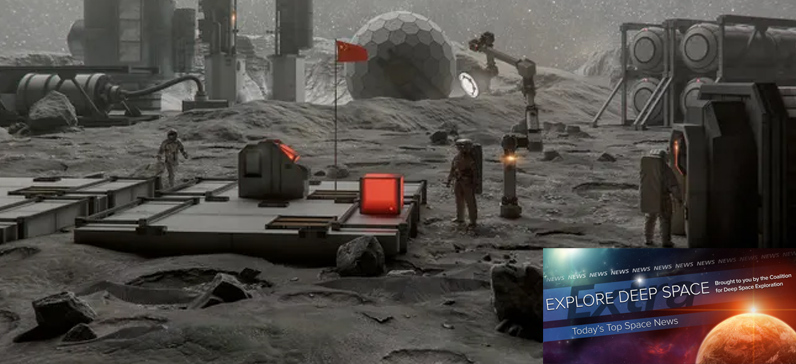Here is a list of news that were published in our Newsletter the week of May 12th, 2025:
Human Space Exploration
- Norway becomes 55th nation to sign NASA Artemis Accords for peaceful space exploration;
- Is NASA ready for the Red Planet? U.S. senator’s ‘Mission to MARS Act’ aims to modernize Johnson Space Center;
- Trump’s NASA budget – shifting from Star Trek to Dune?
- No one knows who’s in charge of Trump’s dramatic space policy;
- After back-to-back failures, SpaceX tests its fixes on the next Starship;
- Axiom Mission 4 delayed due to Dragon capsule readinessCoalition Member in the News – Axiom Space;
- China signs deal with Russia to build a power plant on the Moon potentially leaving the U.S. in the dust;
- Budget cuts and the fraying of international partnerships
Coalition for Deep Space Exploration in the News and Coalition Members in the News – Boeing, Lockheed Martin, Northrop Grumman; - China to launch new modules to Tiangong space station;
Space Science
- Trump’s proposed 2026 NASA budget cuts will cede our space ‘position of leadership to other nations’, top scientists say;
- House hearing on asteroid threats also takes up budget threats;
- Scientists calculate when the universe will end it’s sooner than expected;
- Voyager 1 revives backup thrusters before command pause;
- Volcanoes shaped the Moon from the inside out, scientists find: ‘Our team was genuinely puzzled’;
- Strong solar activity (updated);
- Trump’s 2026 budget plan would cancel NASA’s Mars Sample Return mission. Experts say that’s a ‘major step back’;
- Altimeter problems, lighting challenges caused IM-2 lunar lander to fall on its side;
- A tiny glass bead from the Moon offers clues to its hidden interior;
- ‘Marsquakes’ reveal clues about a hidden body of water on Mars;
- Proposed experiment could clarify origin of Martian methane;
- Sensors designed to detect nuclear detonations can help track space debris falling to Earth;
- Soviet spacecraft Kosmos 482 crashes back to Earth, disappearing into Indian Ocean after 53 years in orbit;
Other News
- Aschbacher calls on Europe to increase space spending;
- Lawmakers raise alarm over rumored cuts to commercial satellite imagery funding;
- Satellite industry continues modest revenue growth trends;
- A second Trump National Space Council would be busy;
- Pentagon taps more firms to build commercial-military satellite network
Coalition Member in the News – Lockheed Martin; - Right now, space law doesn’t protect historical sites, mining operations and bases on the Moon a space lawyer describes a framework that could;
- U.S. Italy sign joint space security deal;
- Trump administration to keep National Space Council;
- Space agencies grapple with potential changes to Artemis;
- Engine change delays ispace-built lunar lander mission;
- U.S. military taps Rocket Lab’s new Neutron launcher for ‘point to point’ cargo test flight in 2026;
- New Mexico’s Spaceport America looks up and into the future;
Major Events This Week:
- The Center for Strategic and International Studies (CSIS) is hosting a webinar on Wednesday from 1 p.m. to 2 p.m. EDT on NASA’s 2026 budget outlook. The presentation follows the May 2 release of the top-line of the budget by the White House Office of Management and Budget that includes a nearly 25 percent reduction in proposed NASA spending for the fiscal year that begins October 1. Registration is available on the CSIS.org website.
- The U.S. House Space and Aeronautics Subcommittee has scheduled a Thursday 10 a.m. EDT hearing on NASA’s planetary defense strategy, an initiative responsible for the discovery and tracking of asteroids and comets that could pose an impact threat to Earth. NASA’s Near Earth Object Surveyor, a space observatory developed to inherit future asteroid and comet discovery and tracking responsibilities, is planned for launch in 2027.
- Also on Thursday evening, retired NASA flight director Eugene Kranz is to be honored by the American Astronomical Society with the Lifetime Achievement Award in ceremonies at Space Center Houston, the visitors center at NASA’s Johnson Space Center. Kranz led efforts by Mission Control to safely return the Apollo 13 astronauts back to Earth in 1970 after their spacecraft experienced a service module explosion enroute to the Moon with three astronauts on board.
- Meanwhile this week, the House and Senate continue to work on reconciliation legislation affecting future federal spending and debt limits.
Subscribe to our Daily Newsletter:
Don’t miss the latest developments in space policy, science, and exploration with Deep Space Extra, delivered directly to your inbox from Monday to Friday.
|
|

